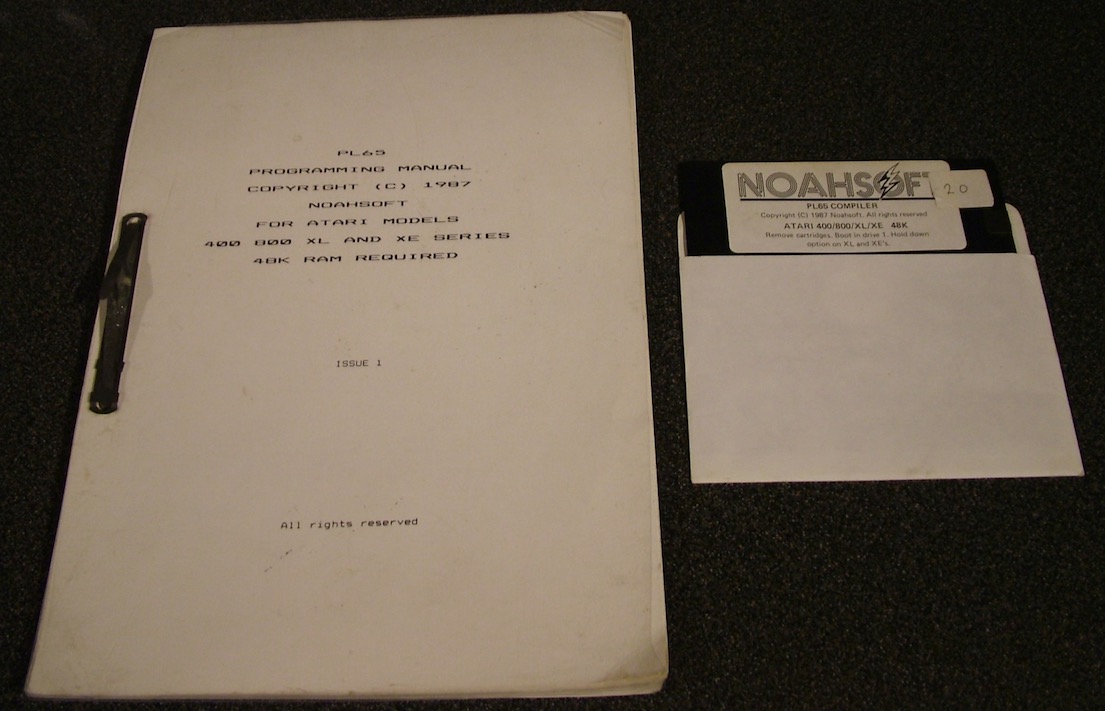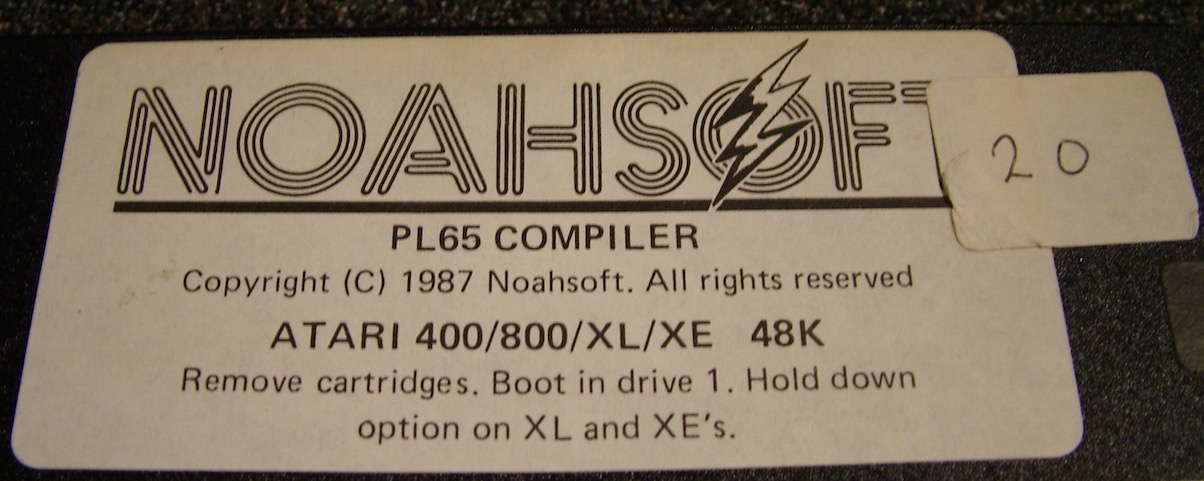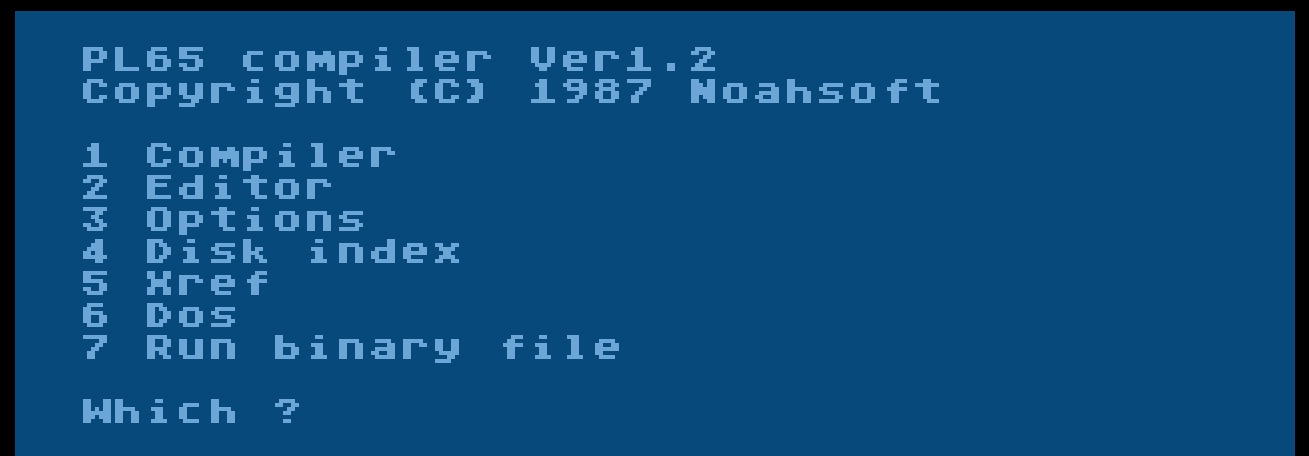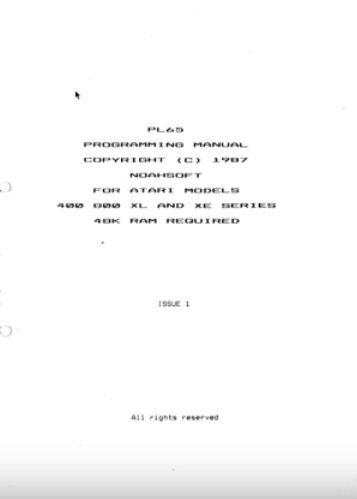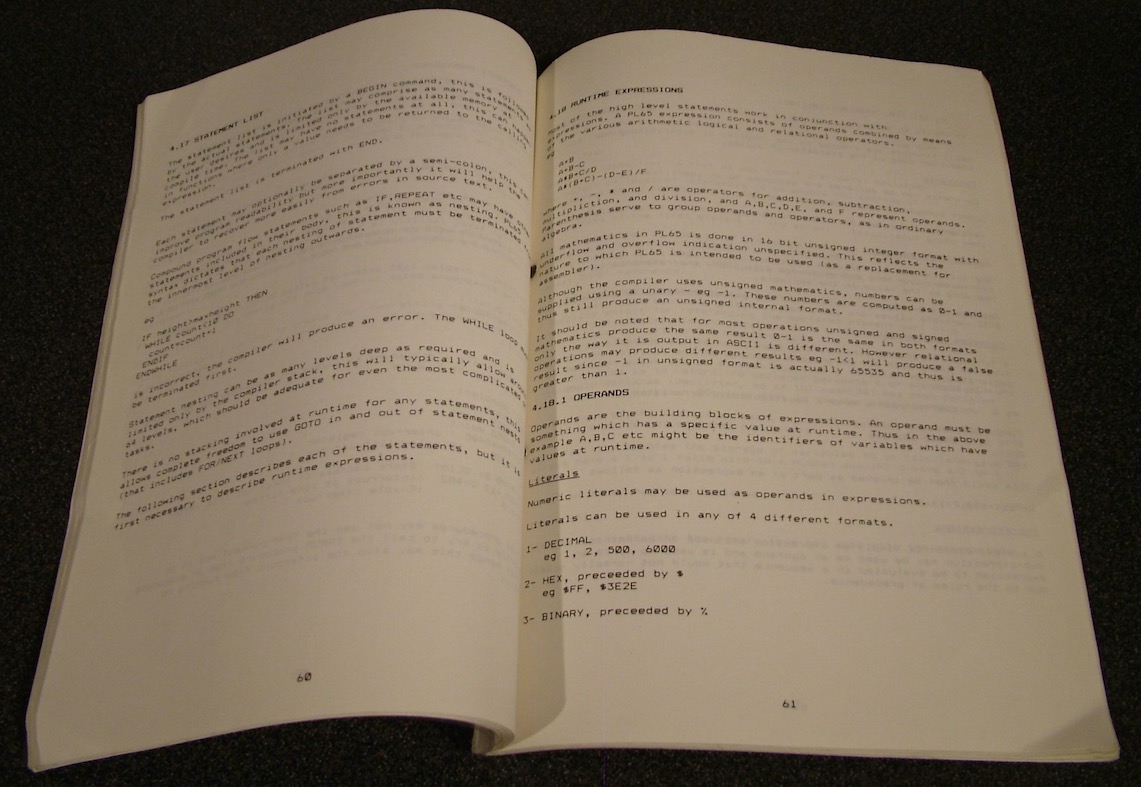PL65#
Copyright (C) 1987 Noahsoft
Background#
PL65, like the better-known
Action, is a high-level ALGOL-derived language intended to produce high-performance code in a more readable format than
assembler. The two languages share overall terms, syntax, and structure. The main difference is that PL65 includes a STRING type, something Action! lacked, but like Action!, PL65 also lacks a FLOAT type.
One unique feature of PL65 is that it includes two full-screen editors. The main editor is KED. It includes modern features like indentation support, search and replace, and block copy/paste. A second editor, the "micro editor", is included in the compiler program, allowing you to make minor changes without having to switch programs.
PL65 allows libraries to be referenced in a program using the INCLUDE directive, in a fashion largely identical to C's #include. However, it also includes the LINK command, normally placed at the end of a file, which allows several files to be stitched together into one larger file. The difference is that INCLUDE begins compiling the referenced file when it is seen in the code, whereas LINK occurs only when the current file is completely compiled, even if the LINK is placed higher in the code.
Here's a working disk image of PL65 for anyone who wants to try what must be the rarest of Atari 8-bit languages. To use it, boot with SpartaDOS (an X cart image in one of the emulators is a good development environment), run PL65.COM and choose from the various menu options. SAMPLE.PRG is a useful example program to figure out some of the finer points of the language (there's no manual on the disk) and S.OBJ is the compiled source. Little or no third-party documentation exists and I don't have a manual. I have one in-depth magazine article (in 8:16, BaPAUG's magazine, written by Simon Trew). The package consists of a compiler, editor, library and a sample game.
ATR Image#
Source Code#
- pl65src.zip
 ; Thank you DanBoris from AtariAge for giving us this partially commented disassembly of the PL65 sample program along with some plain ASCII versions of the source file and libraries. We really appreciate your help! :-)))
; Thank you DanBoris from AtariAge for giving us this partially commented disassembly of the PL65 sample program along with some plain ASCII versions of the source file and libraries. We really appreciate your help! :-)))
Manual#
- PL65-Manual.pdf
 ; size: 6.8 MB ; Thank you so much spookt from AtariAge for your help in this case and MrFish for the post-processing. :-)
; size: 6.8 MB ; Thank you so much spookt from AtariAge for your help in this case and MrFish for the post-processing. :-)
- PL65-Manual.m.pdf
 ; size: 485 kB ; Mobile-friendly version from 2016-08-27 by Petr Antos
; size: 485 kB ; Mobile-friendly version from 2016-08-27 by Petr Antos
Reference#
Picture#
PL65 manual and disk
PL65 disk sticker
PL65 startscreen
PL65 manual cover
PL65 manual example
Movies#
Sample Code#
Thank you 576XE from AtariAge!
!====================================!
! KEYS.LIB
! PL65 Keys operations.
!------------------------------------!
CONST UPA=142,DNA=143,LTA=134,RTA=135
CONST ESC=28,SPC=33,TAB=44,RET=12
CONST none=255
BYTE CH=764
!------------------------------------!
PROC AnyKey()
BEGIN
WHILE CH=none DO ENDWHILE CH=none
END
!------------------------------------!
FUNC InKey()
BYTE k
BEGIN
WHILE CH=none DO ENDWHILE k=CH CH=none
END k
!------------------------------------!
! Only Declarations for clear compiling!
! Definitions must be in MAIN() as BODY.
PROC EscF() FORWARD
PROC UpaF() FORWARD
PROC DnaF() FORWARD
PROC LtaF() FORWARD
PROC RtaF() FORWARD
PROC SpcF() FORWARD
PROC TabF() FORWARD
PROC RetF() FORWARD
PROC DefF() FORWARD
!------------------------------------!
PROC ParsKey(BYTE Key)
BEGIN
CASE Key
OF ESC DO EscF() ENDOF
OF UPA DO UpaF() ENDOF
OF DNA DO DnaF() ENDOF
OF LTA DO LtaF() ENDOF
OF RTA DO RtaF() ENDOF
OF SPC DO SpcF() ENDOF
OF TAB DO TabF() ENDOF
OF RET DO RetF() ENDOF
ELSE
DefF()
ENDCASE
END
!------------------------------------!
ENDFILE
! Keyboard Parser
INCLUDE TERMINAL.LIB
INCLUDE KEYS.LIB
PROC POS(INT COL=$55 BYTE ROW=$54)
BEGIN END ! Gets data from stack
!------------------------------------!
PROC CLR() BEGIN PUT(0,125) END
!------------------------------------!
BODY EscF BEGIN POS(18,10) WRTSTR("ESC") END
BODY UpaF BEGIN POS(18,10) WRTSTR("UPA") END
BODY DnaF BEGIN POS(18,10) WRTSTR("DNA") END
BODY LtaF BEGIN POS(18,10) WRTSTR("LTA") END
BODY RtaF BEGIN POS(18,10) WRTSTR("RTA") END
BODY SpcF BEGIN POS(18,10) WRTSTR("SPC") END
BODY TabF BEGIN POS(18,10) WRTSTR("TAB") END
BODY RetF BEGIN POS(18,10) WRTSTR("RET") END
BODY DefF BEGIN POS(18,10) WRTSTR("BAD") END
!------------------------------------!
MAIN()
BYTE k
BEGIN
CLR()
WRTLN("Keys Parsing Sample")
WRTLN("Waiting a KEY...") CR()
REPEAT
k=InKey() ParsKey(k)
UNTIL k=ESC
END
!====================================!
! ALLOC.LIB Memory allocation library
! for PL65 compiler !
! First-fit algorythm for malloc/free
!------------------------------------!
! by Evgeny Zolotarev (aka 576XE),2017
!====================================!
CONST NULL=0,FRED=1,USED=0
CONST MEMSTART=$4000,MEMEND=$BC00
CONST MEMSIZ=MEMEND-MEMSTART
CONST METALEN=6,BYTSZ=1,INTSZ=2
!------------------------------------!
POINTER gpP INT gpV BASED gpP
POINTER freList
!------------------------------------!
FUNC getFlag(INT adr)
BEGIN gpP=adr END gpV
!------------------------------------!
FUNC getSize(INT adr)
BEGIN gpP=adr+2 END gpV
!------------------------------------!
FUNC getNext(INT adr)
BEGIN gpP=adr+4 END gpV
!------------------------------------!
PROC setFlag(INT adr,flag)
BEGIN gpP=adr gpV=flag END
!------------------------------------!
PROC setSize(INT adr,size)
BEGIN gpP=adr+2 gpV=size END
!------------------------------------!
PROC setNext(INT adr,next)
BEGIN gpP=adr+4 gpV=next END
!------------------------------------!
PROC memInit()
BEGIN
setFlag(freList,FRED)
setSize(freList,MEMSIZ-METALEN)
setNext(freList,NULL)
END
!------------------------------------!
PROC split(POINTER fits INT size)
POINTER new INT blkSiz
BEGIN
blkSiz=METALEN+size
new=fits+blkSiz
setFlag(new,FRED)
setSize(new,getSize(fits)-blkSiz)
setNext(new,getNext(fits))
setFlag(fits,USED)
setSize(fits,size)
setNext(fits,new)
END
!------------------------------------!
FUNC alloc(INT nBytes)
POINTER curr,result
BEGIN
IF (getSize(freList)=0) THEN
memInit()
WRTLN("Memory initialized") CR()
ENDIF
curr=freList
WHILE ((getSize(curr)<nBytes OR getFlag(curr)=USED) AND getNext(curr)<>NULL) DO
curr=getNext(curr)
WRTLN("- Search for fitting block...")
ENDWHILE
IF getSize(curr)=nBytes THEN
setFlag(curr,USED)
result=curr+METALEN
WRTLN("+ Exact fitting block allocated")
RETURN result
ENDIF
IF getSize(curr)>nBytes+METALEN THEN
split(curr,nBytes)
result=curr+METALEN
BASE=16
WRTSTR("Block $") WRITE(result) WRTSTR("-$") WRITE(result+nBytes)
WRTSTR(" size=") BASE=10 WRITE(getSize(curr)) WRTLN(" allocated")
RETURN result
ELSE
result=NULL
WRTLN("- No sufficient memory to allocate")
ENDIF
END result
!------------------------------------!
PROC merge()
POINTER curr
INT size,next
BEGIN
curr=freList
WHILE getNext(curr)<>NULL DO
IF (getFlag(curr) AND getFlag(getNext(curr))) THEN
size=getSize(curr)+getSize(getNext(curr))+METALEN
setSize(curr,size)
next=getNext(getNext(curr))
setNext(curr,next)
ENDIF
curr=getNext(curr)
ENDWHILE
END
!------------------------------------!
PROC free(POINTER ptr)
POINTER curr
BEGIN
IF ptr>=MEMSTART AND ptr<=MEMEND THEN
curr=ptr
curr=curr-METALEN
setFlag(curr,FRED)
merge()
WRTLN("+ Block freed, space merged")
ELSE
WRTLN("Please provide a valid allocated pointer")
ENDIF
END
!====================================!
! End of Library
ENDFILE
INCLUDE TERMINAL.LIB
INCLUDE ALLOC.LIB
MAIN()
POINTER p,r,k
POINTER q,w
BEGIN
freList=MEMSTART
p=alloc(100*INTSZ)
q=alloc(250*BYTSZ)
r=alloc(1000*INTSZ)
free(p)
w=alloc(700)
free(r)
k=alloc(500*INTSZ)
CR() WRTLN("Allocation and deallocation")
WRTLN("are done successfully!")
END
 ; Thank you Fujix from AtariAge for giving us this very rare language! :-)))
; Thank you Fujix from AtariAge for giving us this very rare language! :-)))
 ; Thank you ddez from AtariAge for fixing the existing image! :-)
; Thank you ddez from AtariAge for fixing the existing image! :-)
 ; Thank you 576XE from AtariAge for providing this version! :-)
; Thank you 576XE from AtariAge for providing this version! :-)
 ; Thank you DanBoris from AtariAge for giving us this partially commented disassembly of the PL65 sample program along with some plain ASCII versions of the source file and libraries. We really appreciate your help! :-)))
; Thank you DanBoris from AtariAge for giving us this partially commented disassembly of the PL65 sample program along with some plain ASCII versions of the source file and libraries. We really appreciate your help! :-)))
 ; size: 6.8 MB ; Thank you so much spookt from AtariAge for your help in this case and MrFish for the post-processing. :-)
; size: 6.8 MB ; Thank you so much spookt from AtariAge for your help in this case and MrFish for the post-processing. :-)
 ; size: 485 kB ; Mobile-friendly version from 2016-08-27 by Petr Antos
; size: 485 kB ; Mobile-friendly version from 2016-08-27 by Petr Antos





